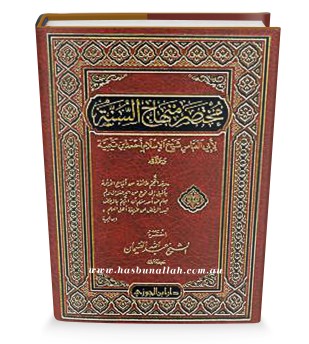Author: Sheykh ul Islam Ibn Taymiyah
Abridged By: Shaykh ‘Abd Allah al-Ghunayman
One of the classical works and considered as a slicing sword when it comes to the matter of refuting the Shi’a, Rafida and the Qadariyya. This work is based on extensive debate of the Imam with the aforementioned groups and thus covers a lot of their defunct arguments. It has been abridged so as to make the original work that was too large, to make it easier for readers to read and digest.
About the Author:
Shaykh al-Islam Taqi ud-Din Abu’l-Abbas Ahmad Ibn al-Halim ibn Abd al-Salam Ibn Taymiyah al-Hanbali was born in 661 AH (1263 AC) in Haran, which is now in Eastern Turkey near the border of northern Iraq. His family had long been renowned for its learning . Among his teachers was Shams ud-Din Al-Maqdisi, the first Hanbali Chief Justice of Syria following the reform of the judiciary by Baibars. The number of Ibn Taimiyah’s teachers exceeds two hundred. Ibn Taimiyah was barely seventeen years old when Qadi Al-Maqdisi authorized him to issue Fatwa (legal verdict). Qadi remembered with pride that it was he who had first permitted an intelligent and learned man like Ibn Taimiyah to give Fatwa. At the same age he started delivering lectures. When he was thirty, he was offered the office of Chief Justice but he refused it as he could not persuade himself to follow the limitations imposed by the authorities.
Imam Ibn Taimiyah’s education was essentially that of a Hanbali theologian and jurisconsult. But to his knowledge of early and classical Hanbalism, he added not only that of the other schools of jurisprudence but also that of other literature. He had an extensive knowledge of Quran, Sunnah, Greek philosophy, Islamic history, and religious books of others, as is evident from the variety of the books he wrote. May Allah swt have mercy on his soul.
Download Book | Size: 9.9 MB | Downloaded 4,184 times

